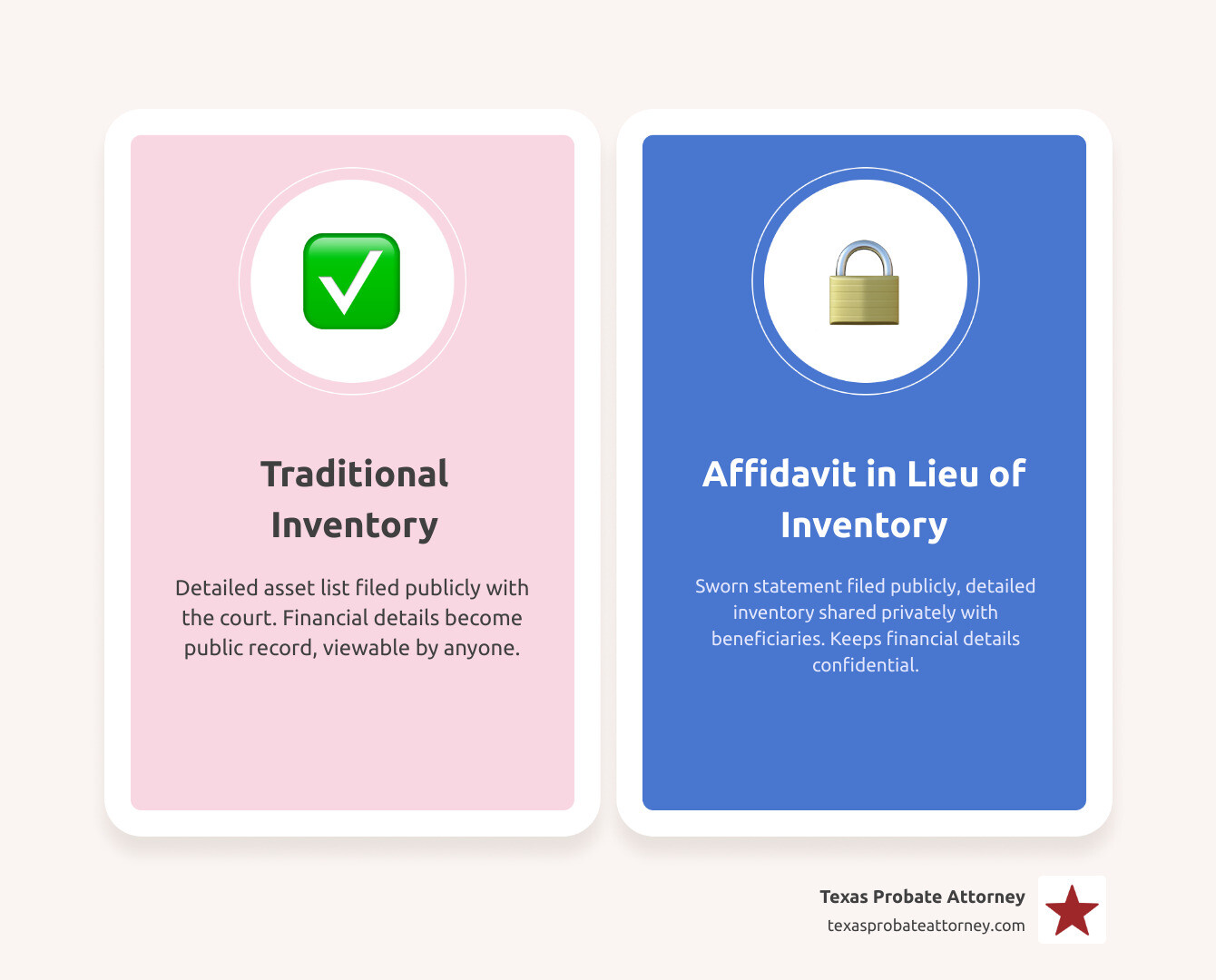Texas Probate Shortcut—Affidavit in Lieu of Inventory Explained

Related Posts
Why the Affidavit in Lieu of Inventory is a Game-Changer for Texas Probate
If you are handling an independent administration texas affidavit in lieu of inventory, here is what you need to know:
Quick Answer for Independent Administration Texas Affidavit in Lieu of Inventory:
- Who can use it: Independent executors/administrators only (not dependent administrations)
- When it’s allowed: Death after September 1, 2011, and all unsecured debts are paid
- What it does: Avoids filing a public inventory by filing a private sworn statement
- Key benefit: Keeps estate details private instead of becoming public record
- Filing deadline: Within 90 days of appointment (same as regular inventory)
- Requirements: Must provide a detailed inventory to beneficiaries privately
When someone dies in Texas, the law typically requires executors to file a detailed public inventory of all assets and debts. However, a valuable shortcut exists for families in Houston, Fort Worth, and Austin.
The Affidavit in Lieu of Inventory allows independent executors to skip the public filing. Instead of broadcasting your loved one’s financial details, you file a sworn statement confirming that debts are paid and beneficiaries have received the inventory privately.
This probate shortcut became available in 2011 under Texas Estates Code § 309.056 to protect family privacy while meeting legal requirements. The catch is that you must pay off all unsecured debts, such as credit cards and medical bills, before the 90-day filing deadline.
The key difference is simple: A regular inventory becomes a public record that anyone can view at the courthouse. An affidavit in lieu keeps those details private between you and the beneficiaries.
Independent administration texas affidavit in lieu of inventory terms to learn:
- duties of independent administrator texas
- independent administration texas estates code
- what is an independent administrator in texas
What is an Affidavit in Lieu of Inventory in a Texas Probate?
For families in Houston, Fort Worth, and Austin, an independent administration texas affidavit in lieu of inventory serves as a privacy shield for an estate. Instead of filing a detailed public inventory at the Harris, Tarrant, or Travis County courthouse, this sworn statement allows you to keep those details private while complying with Texas law.
Under Texas Estates Code § 309.056, this legal document confirms to the court that you have handled the estate’s affairs properly. It states that you have paid the debts and provided all necessary financial details to the beneficiaries, keeping the specifics within the family.
The value of this approach is clear when comparing independent administration to dependent administration. A dependent administration requires constant court permission for actions like selling a house or paying a bill, and a detailed public inventory is always mandatory.
With independent administration in Houston, Fort Worth, or Austin, you can manage the estate with more autonomy. Once appointed, you are largely free from court supervision. The affidavit is a key tool in this process, satisfying the court while protecting your family’s financial privacy.
More info about Independent Administration Texas Estates Code
Who Can Use an Affidavit in Lieu of Inventory?
This probate shortcut is not available to every estate in Texas, but for qualifying families in Houston, Fort Worth, and Austin, it is a valuable tool. Only an independent executor or independent administrator who meets several criteria can use this option.
First, you must be serving in an independent capacity. This means the will named you as an independent executor, or all heirs agreed to an independent administration that the court approved.
The decedent must have died after September 1, 2011, when this provision was added to Texas law. For deaths occurring before this date, a full inventory is required.
The most critical requirement for estates in Houston, Fort Worth, and Austin is that there can be no unpaid unsecured debts when the inventory is due. This includes credit cards, medical bills from local providers, and personal loans. If any of these debts remain when the 90-day deadline arrives, the affidavit cannot be used.
Secured debts, like mortgages and car loans, are an exception and can remain. Taxes and administration expenses, such as attorney fees, are also exempt. However, all other unsecured debts must be settled first.
What is an Independent Administrator in Texas?
What Information Must Be Included?
The independent administration texas affidavit in lieu of inventory is a sworn statement signed under oath, promising the court that its contents are true.
The affidavit filed in the Houston, Fort Worth, or Austin probate court must confirm that all debts are paid, aside from the allowed exceptions. You are formally stating that every credit card bill, medical expense, and personal loan has been settled. The only remaining debts should be secured debts, taxes, or administration expenses.
Crucially, even though you are not filing the inventory publicly, you must still create one. A complete, detailed inventory of every asset and liability must be prepared and a verified copy provided to all beneficiaries. This ensures that everyone entitled to inherit receives a full financial picture without exposing it to the public.
This private inventory must be thorough, listing all bank accounts, real estate in areas like Houston’s suburbs or downtown Austin, investments, and valuable personal property with their fair market values as of the date of death. It must also include any claims against the estate and distinguish between separate and community property, a common point of complexity for Texas families.
Beneficiaries may provide a written waiver stating they do not need the detailed inventory, but most families we assist in the Houston, Fort Worth, and Austin areas find the complete, private financial picture helpful.
More info about Probate vs. Non-Probate Assets in Texas
The Independent Administration Texas Affidavit in Lieu of Inventory: A Step-by-Step Guide
Filing an independent administration texas affidavit in lieu of inventory is a manageable process that, when done correctly, saves time and protects your family’s privacy. Here is a guide for executors in Houston, Fort Worth, and Austin.
The affidavit is filed at the County Clerk’s office in Harris, Tarrant, or Travis County within a 90-day deadline from the date you were appointed. While these courts can grant extensions, meeting the original deadline is always the best course of action.
Step 1: Verify Eligibility and Pay Debts
First, ensure you qualify for this option. We confirm your independent administration status by checking the court order from the probate court in Houston, Fort Worth, or Austin that appointed you. We also verify the decedent passed away after September 1, 2011.
Next, you must settle all unsecured debts of the estate. For a decedent who lived in Houston, Fort Worth, or Austin, this includes credit cards, medical bills from local hospitals, personal loans, and utility bills—any debt not secured by collateral. Each one must be paid off before you can file the affidavit.
Documenting these payments is vital. Keep careful records of when and how each debt was paid. Mortgages, car loans, administration expenses, and court costs are exceptions. However, a single unpaid credit card bill will disqualify the estate, forcing you to file a full public inventory.
Duties of Independent Administrator Texas.
Step 2: Prepare and Distribute the Full Inventory to Beneficiaries
Although you are not filing it publicly, you must still create a detailed inventory to be shared privately with the beneficiaries.
We begin by appraising property at its fair market value as of the date of death. This includes everything from a family home in Houston to a car collection in Fort Worth, along with bank accounts and investments. For real estate and unique assets, professional appraisers are often necessary to obtain accurate values.
The inventory must also list any claims the estate has against others, providing a complete financial snapshot of assets and receivables.
Once compiled, we provide a verified copy to all beneficiaries entitled to inherit from the estate, as required by Texas Estates Code § 309.056. This ensures every beneficiary is fully informed.
A written waiver option exists in certain situations. If an inheritance is small (under $2,000), has already been distributed, or the beneficiary declines the inventory, they can waive their right to receive it in writing. We recommend getting these waivers in writing for your protection.
Step 3: Draft and File the Affidavit with the Court
The final step is to complete the affidavit form. This is a sworn statement confirming that all legal requirements have been met—debts are paid, and beneficiaries have received their detailed inventory.
The independent executor or administrator must swear before a notary public that the information in the affidavit is true. This is a legally binding oath and should not be taken lightly.
We then file the affidavit with the county clerk in Harris, Tarrant, or Travis County, depending on where the probate was opened. Once filed and accepted by the court, supervision generally ends.
Remember the 90-day filing deadline. Missing it can lead to a motion for your removal, fines up to $1,000, and liability for damages from the delay.
Common filing mistakes we help clients avoid include:
- Harris County (Houston): Forgetting the decedent’s social security number or miscategorizing property in the private inventory.
- Tarrant County (Fort Worth): Filing before all beneficiaries receive the inventory or without securing necessary written waivers.
- Travis County (Austin): Using incorrect property values or failing to state clearly in the affidavit that all non-exempt debts have been paid.
Benefits vs. Potential Drawbacks
For executors in Houston, Fort Worth, and Austin, choosing between a full inventory and an independent administration texas affidavit in lieu of inventory is a critical decision, balancing public disclosure against family privacy.
Most families we assist in Houston, Fort Worth, and Austin prefer the privacy offered by the affidavit. However, it is important to understand both its significant benefits and potential risks before proceeding.
Key Benefits of Filing an Affidavit in Lieu of Inventory
The primary benefit is privacy. A traditional inventory filed at the Harris, Tarrant, or Travis County courthouse is a public record, making your family’s financial information permanently available to anyone. An affidavit in lieu prevents this public disclosure.
Maintains Financial Privacy: Sensitive details about bank accounts, investments, and property located in Houston, Fort Worth, Austin, or elsewhere remain between you and the beneficiaries.
This process also simplifies court filings in Harris, Tarrant, and Travis counties. Instead of a lengthy public document, you file a straightforward sworn statement. This streamlined approach reduces administrative burden and can lead to potentially lower costs due to less paperwork.
For estates with cooperative beneficiaries and all unsecured debts paid, this option makes the probate process more manageable and private.
How to Avoid Probate Court in Texas.
Potential Drawbacks of an Independent Administration Texas Affidavit in Lieu of Inventory
However, the affidavit is not without risks, and it is important to consider potential complications.
Beneficiary disputes can still arise. If a beneficiary questions the private inventory’s values or completeness, they can petition the probate court in Houston, Fort Worth, or Austin to compel a full public inventory. This can escalate tensions during an already difficult time.
The risk of misrepresentation on a sworn statement is serious. Any false information, even if unintentional, can lead to penalties for errors, including fines up to $1,000, removal as executor, and personal liability for any resulting damages.
Court scrutiny from a Harris, Tarrant, or Travis County judge can increase if problems arise. If the judge suspects issues with the affidavit, they may impose greater oversight, negating the benefit of reduced court involvement.
Contesting the affidavit is another risk. Any interested party, such as a beneficiary or creditor, can challenge whether the conditions for filing the affidavit were met, such as claiming that debts were not fully paid.
If you have a straightforward estate with cooperative beneficiaries, the benefits often outweigh the risks. But for estates with family tensions or complex finances, a traditional inventory may offer more protection.
Common Issues and Legal Considerations
When using an independent administration texas affidavit in lieu of inventory, you must steer a complex set of legal rules. Understanding common pitfalls can prevent costly mistakes for executors in Houston, Fort Worth, and Austin.
The Texas Estates Code has strict requirements, and what seem like minor details can have major consequences for estates in Houston, Fort Worth, and Austin. Here are the most common issues we see in our practice.
Decoding the Texas Probate Code: A Comprehensive Overview.
What if the Estate Has Unpaid Debts?
The “no unpaid debts” rule is a frequent hurdle, but it comes with important exceptions. Texas law distinguishes between debts that are acceptable to leave unpaid and those that must be settled before filing.
- Secured debts are permissible. A mortgage on a home in Austin or a car loan on a truck does not disqualify you from using the affidavit.
- Taxes, such as property or income taxes, are also exempt and can remain outstanding.
- Administration expenses, including court costs, attorney fees, and funeral expenses, do not need to be paid before filing.
However, all other unsecured debts must be paid in full. This includes credit card balances, medical bills, and personal loans. We have seen executors in Houston find a forgotten bill just before the deadline, forcing them to file a public inventory over a small balance.
Thorough investigation early in the process is key. For our clients in Houston, Fort Worth, and Austin, we help review financial records and contact local and national creditors to ensure all unsecured debts are identified and settled.
Texas Estates Code chapter 309. inventory, appraisement, and list of claims.
Contesting an Affidavit and Penalties for Non-Compliance
Even with careful preparation, challenges to the affidavit can occur, as it is a sworn legal document.
Beneficiary complaints are a common source of trouble. If an heir in Houston, Fort Worth, or Austin believes they did not receive a proper inventory or that debts remained unpaid, they can file a motion to compel inventory with the local probate court. This action forces you to defend your filings and may result in having to file the public inventory you sought to avoid.
Penalties for errors are severe. Misrepresentation in a sworn affidavit can lead to a fine of up to $1,000. If false statements cause financial harm, you could be held personally liable for those damages.
Removal as executor is the court’s most serious response. Providing false information or missing the filing deadline can result in the court removing you from your position and holding you personally liable for any resulting issues.
Failure to file on time is an avoidable but common mistake. The 90-day deadline is firm. Missing it without a court-approved extension can lead to fines, removal, and liability. The courts in Harris, Tarrant, and Travis counties expect executors to know and follow these rules.
The Role of a Probate Attorney
Attempting to file an independent administration texas affidavit in lieu of inventory without legal guidance is risky.
- Navigating Legal Requirements: A probate attorney can guide you through the specific legal requirements and local court rules in Houston, Fort Worth, and Austin.
- Ensuring Accuracy: We help identify all assets, from real estate in Fort Worth to bank accounts in Austin, obtain proper valuations, find all creditors, and confirm every unsecured debt is paid to prevent the process from being derailed.
- Protecting You from Liability: With over 40 years of combined experience, Stacy Kelly and Stacy Kelly use their litigation background to protect you from personal liability while ensuring you meet your fiduciary duties.
- Drafting Documents: We ensure the affidavit contains the required legal language, is properly notarized, and includes all necessary attestations to be valid.
- Representing the Estate: If a dispute arises, having an experienced litigation attorney on your side is critical for achieving a quick resolution and avoiding a costly court battle.
It is far more effective and less costly to secure legal help from the start rather than trying to fix mistakes later.
How Much Does a Probate Attorney Cost in Texas?.
Frequently Asked Questions about the Affidavit in Lieu of Inventory
When we work with families in Houston, Fort Worth, and Austin, these are the questions that come up most often about the independent administration texas affidavit in lieu of inventory. Here are straightforward answers.
What is the difference between a full inventory and an Affidavit in Lieu of Inventory?
A full inventory is a detailed public document filed with the probate court in Harris, Tarrant, or Travis County, listing all estate assets, values, and claims. Anyone can view it. In contrast, an Affidavit in Lieu of Inventory is a sworn statement filed with the same court confirming that debts are paid and beneficiaries have privately received the detailed inventory. This keeps the estate’s financial specifics out of the public record.
What happens if I miss the 90-day filing deadline in Texas?
Missing the 90-day filing deadline in a Houston, Fort Worth, or Austin probate has serious consequences. The court can remove you as executor, impose a fine of up to $1,000, and hold you personally liable for any damages caused by the delay. An interested party, such as a beneficiary or creditor, can file a motion with the court to start this process.
Courts may grant an extension if you request one before the deadline passes. Our attorneys help clients in Houston, Fort Worth, and Austin manage these critical dates to avoid penalties.
Can I file an Affidavit in Lieu of Inventory in a dependent administration?
No. The independent administration texas affidavit in lieu of inventory is available only to independent executors or administrators in Texas, including those in Houston, Fort Worth, and Austin. Dependent administrations require close court supervision, which includes the filing of a detailed public inventory for the court’s review and approval. Independent administrations grant executors more freedom, and the affidavit exists to confirm rules are being followed without constant oversight.
Navigating Your Duties as an Independent Executor
As an independent executor in Houston, Fort Worth, or Austin, using the independent administration texas affidavit in lieu of inventory can simplify your duties, but only when used correctly. It offers a path to efficiency and privacy, but you must strictly adhere to the rules of the Texas Estates Code and any local court rules.
For any probate case in Houston, Fort Worth, or Austin, the key requirements are paying all unsecured debts before the 90-day deadline and providing a detailed, private inventory to all beneficiaries. This ensures transparency within the family while maintaining privacy from the public.
This approach is ideal for estates with straightforward assets and minimal complications. For a Houston family with a home, bank accounts, and no complex issues, the affidavit allows the process to move smoothly so everyone can focus on healing.
However, for more complex estates in Fort Worth or Austin with significant unresolved debts or beneficiary disputes, a traditional full inventory might be the only, or wiser, choice. The transparency of a public filing can sometimes protect you from future legal challenges.
As an independent executor in Harris, Tarrant, or Travis County, you must balance efficiency with legal compliance. A single misstep, such as missing a debt or failing to notify a beneficiary, can lead to court challenges, fines, or even your removal from the role.
This is where experienced legal guidance is critical. At Texas Probate Attorney, Stacy Kelly and Stacy Kelly offer over 40 years of combined experience helping families steer these matters in Houston, Fort Worth, and Austin. We provide the personalized attention and strong advocacy needed during a difficult time.
Contact us to learn more about Independent Administration in Texas and find out how we can help you fulfill your duties correctly while protecting your family’s privacy.





